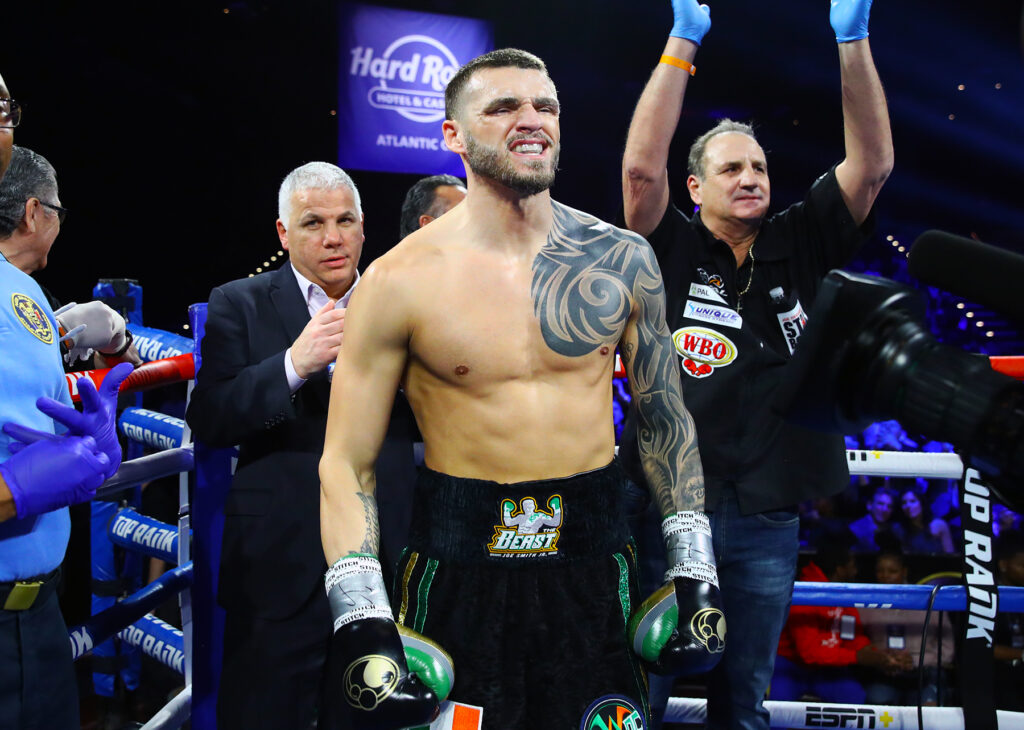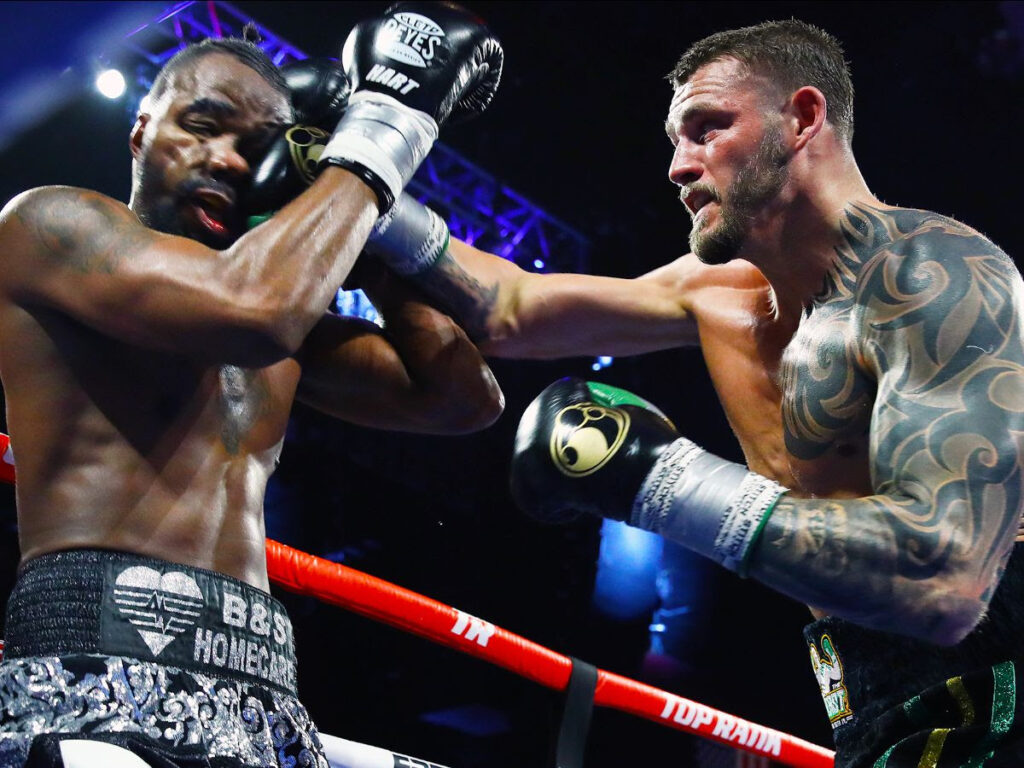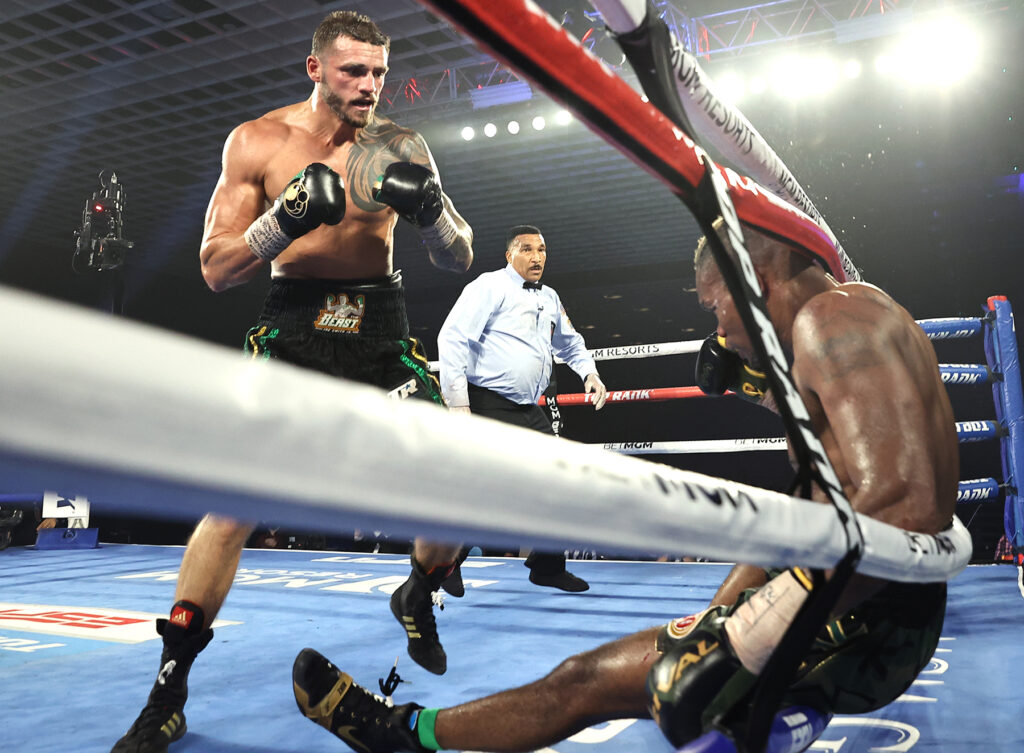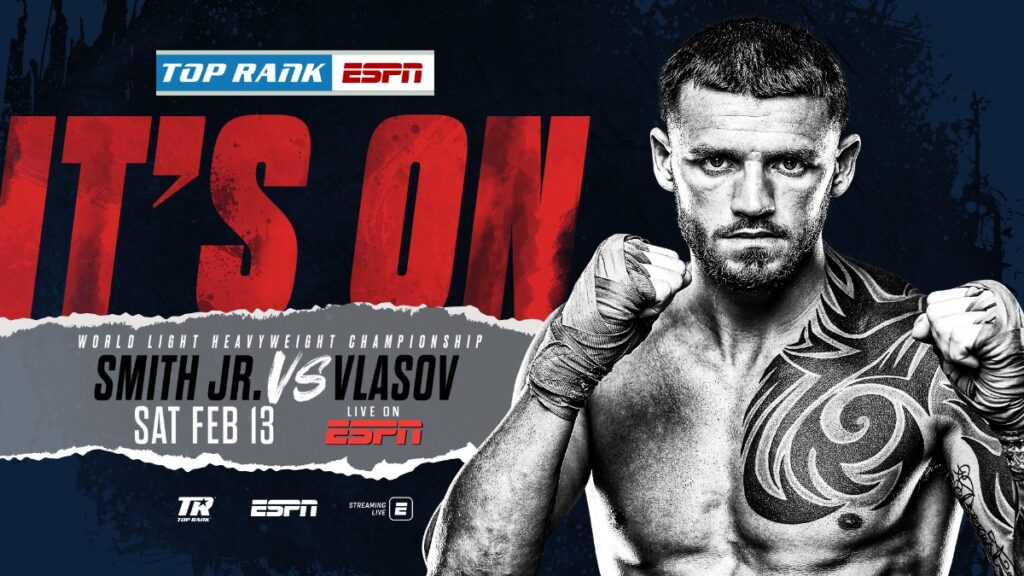“…I got Mary pregnant
And man, that was all she wrote
And for my nineteenth birthday
I got a union card and a wedding coat.”
This haunting lament for lost or never found opportunity comes straight from Bruce Springsteen’s iconic ‘The River’. Central to its theme is the flushing away of youth way too early in the face of the wrecking ball of unplanned responsibility. It may have been written and performed by ‘The Boss’ but Joe Smith Jr. has drummed out the tune on building sites and gymnasium floors for more than a dozen years.
Springsteen’s early works were often all about hope; of the desperation to break free from the shackles of a life that promised nothing but drudgery. A world where only Friday night beer could blur and break the walls of a prisoned existence. But ‘The River’ offered no way out like ‘Born to Run’ or ‘Thunder Road’ – just more of the same despair.
Springsteen’s tales may have been set further down the shore in Asbury Park, but Smith and many of his contemporaries would have recognised them in their Long Island home of Shirley and Mastic Beach. The light-heavyweight, who challenges Maxim Vlasov for the vacant WBO title next month, describes it as, “A tough neighbourhood. I’ve had some good times and some bad times, but it was definitely a tough neighbourhood growing up. There were some tough kids around.”
For Smith, his journey into boxing began as a 13-year-old. Moving in with his father – who had become a parent to Joe whilst still a teenager – he was taken to the local gym to keep him busy. The coaches quickly realised that Smith had power in his right-hand beyond his callow years. “Within a couple of months, I had my first fight,” he remembers. “I did good and just kept on going from there. I had power but lots to learn. They put me in with older guys and saw I was hurting them as well, so the coaches were like: ‘You gotta’ stick with it.’”
Smith did just that and achieved solid success at amateur level, winning the New York Golden Gloves. Along the way, at just 18, he became father to a little girl – a form of history repeating itself – and had to face up to the responsibility of an urgent need to provide. Turning his back on a four-year college scholarship, he took the short-end blue-collar route and pinned his long-term hopes on boxing as the perilous pathway to a better future.
Amidst this backdrop, turning pro was an easy decision to contemplate. “I had a big family anyway, lots of younger brothers and sisters. I always thought if I could better myself, I could help them out. All I wanted to do was to change my life and theirs,” he admits.
“For me, it is all about making some money and becoming a world champion. My trainer Jerry Capobianco [who has been with Smith since almost the beginning] told me back then: ‘Give me a couple of years and I’ll make you a world champion’. I was like: ‘Yeah, okay, you’re crazy!’”

Photo: Mikey Williams/Top Rank.
But it has been this world title dream and its supplementary offerings of financial security that has driven Smith through these hard years. Prodding him out of bed in the freezing winter darkness and compelling him to drive to the gym rather than home at the end of a long shift. A long-time member of the Local 66 Laborers Union in Long Island, the 31-year-old’s physical exertion has not been confined to the gymnasium.
“I had to be up at 5am and would get off at three in the afternoon. I would head straight to the gym and work out for an hour; then go home, relax, and do it all again,” he laughs.
“But it was the travel that was actually hardest. I was driving to Long Island City a lot [a ninety-minute drive] and that was tough. By the time I was getting to work I was tired. And then you have a long drive home afterwards, but you still have to go and train.”
Recent high-profile fights, including an unsuccessful tilt at the WBA title against Dmitry Bivol, has enabled Smith to achieve a degree of financial security. No longer on building sites, smashing walls, or carrying bricks; he has his own tree trimming business. The union man is now the boss, although he concedes that his father takes care of the day-to-day business, to allow him to focus on his ring career. Although current business is tough due to Covid-19, he admits that for the first time he is in the position of having, “Okay money coming in. I can survive [No matter what else happens].”
Despite this change in circumstances, Smith takes obvious pride in his working man credentials. His ring name: ‘The Irish Bomber’ – a nod to Smith’s Irish-American heritage – has now given way to that of “The Common Man”. A development caused unwittingly by former opponent Bernard Hopkins, who derided Smith as “common” and thus the antithesis of Hopkins’ own “Special” status in the sport. The 31-year-old sat with silent dignity in the pre-fight press conference, as the rambling Hopkins regurgitated the comparison over and over again in a mangled attempt at an inspirational TED talk. The words later coming back to haunt ‘The Executioner’ as he suffered an eighth-round knockout reverse.
However, it is a no-nonsense persona that the boxing public has warmed to. There is nothing flash about Smith, he talks with his fists in an old-fashioned prize-fighter kind of a way. He has no interest in trash-talking and naked self-promotion. Often, he answers in short, slowly articulated sentences; ending many of them with a short laugh. He comes over as relaxed, secure in his own skin, and not desperate for attention or approval. In many ways, he is a counter-balance to the new breed of boxing celebrity, perhaps encapsulated by Ryan Garcia and his eight million Instagram followers. It is a parallel that Smith, who hasn’t posted on his Twitter account in over three years, has pondered. “Maybe I need to go out and record myself doing some stupid shit, so I can make some money,” he says with a resigned shrug.
“It’s crazy these days, you definitely need to have a lot of social media followers and stuff. It gets a lot of promotion and people like to see it. Boxing isn’t a sport to make lots of money from that’s for sure unless you can be a world champion. I guess that’s why they do it. Maybe I should start over and be a baseball player!”
Smith has faced his share of ups and downs in a 26-3, 21 KOs pro career. In just his seventh contest, on what should have been a routine learning bout against Eddie Caminero, he fractured his jaw on both sides. The injury was so severe that only the skin was left holding it in place. Yet he tried his utmost to carry on before succumbing to the pain and the referee was forced to intervene. Losing his unbeaten record was the least of Smith’s concerns as he contemplated his whole future in the sport. “It was a shitty time. Really horrible,” he recollects.

Photo: Mikey Williams/Top Rank.
“I just thought: ‘That’s it. I’m not doing it again’. But I remember being sat at home for a while and I knew that I still had a shot at getting to the top. I didn’t want to let it go.”
Following reconstructive surgery, which the already cash-strapped Smith had to borrow $75,000 to have completed, his recovery was slow and arduous. Not able to fully open his mouth for several months, he lost 40 pounds in weight and subsisted on a diet of chocolate milkshakes. “I remember sitting at Boston Market parking lot with a syringe, sucking up mashed potato, squirting it into my mouth and dreaming about hamburgers,” he says with a smile. “But I did it. I turned it around and here I am.”
A year of recovery culminated with a knockout of Santos Martinez in two rounds at the Aviator Sports Complex in Brooklyn. Five years and 15 straight wins later, mostly on the local circuit around New York, his breakout opportunity came. Facing Chicago-based Pole Andrzej Fonfara, in front of a noisy home crowd in the ‘Windy City’, he secured victory by the most emphatic means possible.
Fonfara, who had already gone the distance with Adonis Stevenson in an unsuccessful challenge for the WBC title, had entered the ring off the back of victories over Julio Cesar Chavez Jr. and Nathan Cleverly, but was poleaxed inside the opening round; as Smith dropped him with a ferocious right-hand just two minutes in.
Although Fonfara, bravely beat the count, the Long Islander swiftly hunted him down, pinned him in the neutral corner and finished the job. For those watching the WBC International title fight live on NBC, the brutal ending may have come as a shock, but not to the Smith camp. “I definitely went into the fight as the underdog. But I wasn’t nervous at all,” he remembers.
“I listened to my father and trainer. They just told me: ‘When he starts punching, he leaves himself open and that is when you are gonna knock him out. Just throw with him’. And that’s exactly what I did. As soon as he started throwing, I threw that punch and it was game over.
“It was a crazy night. Probably one of the best celebrations after a fight as well. I want more nights like that,” he adds.
The win perfectly showcased Smith’s power-punching style to a broader audience. Ultimately, it caught the attention of Bernard Hopkins and his team, who were seeking an opponent for his career swansong. This earlier victory and its clinical execution had grown Smith’s profile, and he was a credible opponent. However, he is in no doubt that Hopkins considered him to be an unthreatening and easy mark.
It didn’t take long for ‘The Executioner’ to realise his miscalculation. “After the first or second round when I was on top of him the whole time and he wasn’t strong enough to keep me off, I think he figured it out then. But I have got to say he is one tough dude. I hit him with very nice, hard, clean shots; he took them pretty well and I thought: ‘There’s no way I am going to get him out of here’.” he chuckles.

Photo: Mikey Williams/Top Rank.
Early in the eighth round, Smith finally landed a right hand that Hopkins couldn’t shrug off; as his body gave way he slid through the ropes and onto the auditorium floor beneath. “I think he woke up when he hit the floor,” quips Smith. But it was a humiliating ending to a laureled career, further exacerbated by Hopkins groundless claims that he had been pushed.
Following a points loss to Sullivan Barrera – in which another broken jaw early in the fight curtailed his chances – and a failed world title attempt against Dmitry Bivol, many would have expected Smith to quietly slip out of contention. But the 31-year-old – unlike most of the planet – had an outstanding 2020.
Victories over Jesse Hart and Eleider Alvarez have deservedly propelled him to another world title shot. It is a second bite of the cherry for Smith who, although he was comprehensively outpointed by Bivol for the WBA strap, badly hurt the champion right on the bell at the end of the tenth round in their 2019 contest. He admits to watching the fight back and “Wishing that I’d pushed myself a little harder, from the beginning of the round. I think I would have come out on top.” But it taught Smith a lot about staying busy and not just looking for the one big money shot.
Additional experience that he plans to take into his upcoming bout with 48-fight veteran Russian Maxim Vlasov; where he occupies the uncharacteristic position of 1/4 pre-fight favourite with the bookmakers. Careful not to underestimate his opponent, Smith is still confident he will make his dreams a reality. “I’m gonna bring that belt home,” he says. “Winning is going to change a lot of things. It will get me the big money fights. You know; make things happen. It’s gonna be amazing!”
No doubt the guys back at the Laborers’ Union will think it’s “amazing” too. And all those other blue-collar boys working the sites, sweeping the floor and trapped perpetually in a living embodiment of a Bruce Springsteen song. Like the words from Thunder Road, Smith has “One last chance to make it real” and come February 13 in The Bubble at The MGM Grand, he is “Pulling out of here to win.”

Main image and all photos: Mikey Williams/Top Rank.